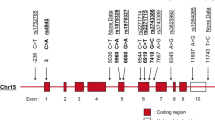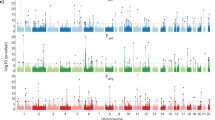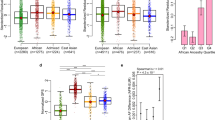Abstract
Immunoglobulin GM and KM genes have been associated with antibody responses to a variety of antigens. A promoter-region polymorphism of interleukin-6 (IL-6) gene (−174 G/C) has been shown to be associated with antibody responses to heat-shock proteins (hsp) 60 and hsp65. To examine the possible epistatic effects of these unlinked genetic systems on the autoimmune responses to hsp60 and hsp65, 176 healthy Caucasian subjects from Finland were genotyped for several allelic determinants of GM, KM, and IL-6 genes by PCR-RFLP methods. IgG antibodies to hsp60 and hsp65 were measured by an ELISA. Significant interactive effects of GM f,z and IL-6-174 genotypes were noted for both anti-hsp60 (P=0.002) and anti-hsp65 (P=0.038) antibody levels. Since these autoantibodies have been implicated in susceptibility to coronary heart disease and carotid atherosclerosis, the associations reported here might be relevant to the etiology of these diseases.
This is a preview of subscription content, access via your institution
Access options
Subscribe to this journal
Receive 6 digital issues and online access to articles
$119.00 per year
only $19.83 per issue
Buy this article
- Purchase on Springer Link
- Instant access to full article PDF
Prices may be subject to local taxes which are calculated during checkout
Similar content being viewed by others
References
Steinberg AG, Cook CE . The Distribution of Human Immunoglobulin Allotypes. Oxford University Press: New York, 1981.
Cavalli-Sforza LL, Menozzi P, Piazza A . The History and Geography of Human Genes. Princeton University Press: Princeton, 1994.
Pandey JP, Elson LH, Sutherland SE, Guderian RH, Araujo E, Nutman TB . Immunoglobulin κ chain allotypes (KM) in onchocerciasis. J Clin Invest 1995; 96: 2732–2734.
Dugoujon JM, Cambon-Thomsen A . Immunoglobulin allotypes (GM and KM) and their interactions with HLA antigens in autoimmune diseases: a review. Autoimmunity 1995; 22: 245–260.
Pandey JP . Immunoglobulin GM and KM allotypes and vaccine immunity. Vaccine 2001; 19: 613–617.
Pandey JP, Vedeler CA . Immunoglobulin KM genes in Guillain–Barré syndrome. Neurogenetics 2003; 4: 147–149.
Veres A, Prohászka Z, Kilpinen S, Singh M, Fust G, Hurme M . The promoter polymorphism of the IL-6 gene is associated with levels of antibodies to 60-kDa heat-shock proteins. Immunogenetics 2002; 53: 851–856.
Balbín M, Grubb A, de Lange GG, Grubb R . DNA sequences specific for Caucasian G3m(b) and (g) allotypes: allotyping at the genomic level. Immunogenetics 1994; 39: 187–193.
Balbín M, Grubb A, Abrahamson M, Grubb R . Determination of allotypes G1m(f) and G1m(z) at the genomic level by subclass-specific amplification of DNA and use of allele-specific probes. Exp Clin Immunogenet 1991; 8: 88–95.
Fishman D, Faulds G, Jeffery R et al. The effect of novel polymorphisms in the interleukin-6 (IL-6) gene on IL-6 transcription and plasma IL-6 levels, and an association with systemic-onset juvenile chronic arthritis. J Clin Invest 1998; 102: 1369–1376.
Prohászka Z, Duba J, Lakos G et al. Antibodies against human heat-shock protein (hsp) 60 and mycobacterial hsp65 differ in their antigen specificity and complement-activating ability. Int Immunol 1999; 11: 1363–1370.
Kuwana M, Medsger TA, Wright TM . Analysis of soluble and cell surface factors regulating anti-DNA topoisomerase I autoantibody production demonstrates synergy between Th1 and Th2 autoreactive T cells. J Immunol 2000; 164: 6138–6146.
Pandey JP, Page GP, Silver RM, LeRoy EC, Bona CA . Anti-fibrillin-1 autoantibodies in systemic sclerosis are GM and KM allotype-restricted. Exp Clin Immunogenet 2001; 18: 123–129.
Kameda H, Pandey JP, Kaburaki J, Inoko H, Kuwana M . Immunoglobulin allotype gene polymorphisms in systemic sclerosis: interactive effect of MHC class II and KM genes on anticentromere antibody production. Ann Rheum Dis 1998; 57: 366–370.
Morahan G, Berek C, Miller JFAP . An idiotypic determinant formed by both immunoglobulin constant and variable regions. Nature 1983; 301: 720–722.
Cooper LJN, Shikhman AR, Glass DD, Kangisser D, Cunningham MW, Greenspan NS . Role of heavy chain constant domains in antibody–antigen interaction. Apparent specificity differences among streptococcal IgG antibodies expressing identical variable domains. J Immunol 1993; 150: 2231–2242.
McLean GR, Torres M, Elguezabal N, Nakouzi A, Casadevall A . Isotype can affect the fine specificity of an antibody for a polysaccharide antigen. J Immunol 2002; 169: 1379–1386.
Pritsch O, Hudry-Clergeon G, Buckle M et al. Can immunoglobulin CH1 constant region domain modulate antigen binding affinity of antibodies? J Clin Invest 1996; 98: 2235–2243.
Spielman RS, Ewens WJ . A sibship test for linkage in the presence of association: the sib transmission/disequilibrium test. Am J Hum Genet 1998; 62: 450–458.
Prohászka Z, Duba J, Horvath L et al. Comparative study on antibodies to human and bacterial 60 kDa heat shock proteins in a large cohort of patients with coronary heart disease and healthy subjects. Eur J Clin Invest 2001; 31: 285–292.
Zhu J, Quyyumi AA, Rott D et al. Antibodies to human heat-shock protein 60 are associated with the presence and severity of coronary artery disease: evidence for an autoimmune component of atherogenesis. Circulation 2001; 103: 1071–1075.
Xu Q, Kiechl S, Mayr M et al. Association of serum antibodies to heat-shock protein 65 with carotid atherosclerosis: clinical significance determined in a follow-up study. Circulation 1999; 100: 1169–1174.
Acknowledgements
This study was supported in part by funds from the US Department of Energy cooperative agreement DE-FC09-02CH11109 and by grants from the Ministries of Education (FKFP 0138/2001) and Health (ETT 248/2001), Hungary. We thank Mr Keith Rocca for expert technical assistance.
Author information
Authors and Affiliations
Corresponding author
Rights and permissions
About this article
Cite this article
Pandey, J., Prohászka, Z., Veres, A. et al. Epistatic effects of genes encoding immunoglobulin GM allotypes and interleukin-6 on the production of autoantibodies to 60- and 65-kDa heat-shock proteins. Genes Immun 5, 68–71 (2004). https://doi.org/10.1038/sj.gene.6364033
Received:
Revised:
Accepted:
Published:
Issue Date:
DOI: https://doi.org/10.1038/sj.gene.6364033
Keywords
This article is cited by
-
Multiple loci comprising immune-related genes regulate experimental neuroinflammation
Genes & Immunity (2010)
-
A genetic variant of immunoglobulin γ2 is strongly associated with immunity to mucin 1 in patients with breast cancer
Cancer Immunology, Immunotherapy (2009)
-
Circulating anti-heat-shock-protein antibodies in normal pregnancy and preeclampsia
Cell Stress and Chaperones (2009)



